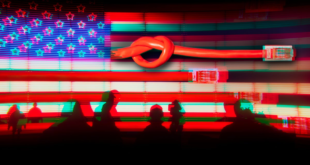Real talk: I’ve seen a lot of zombie movies. I mean a lot. So, I have a fair share of opinions when it comes to the brain-hungry undead. George Romero’s still the master in my books (even though Zack Snyder’s Dawn of the Dead is a formidable remake). I’ve seen Shaun of the Dead more times than I can remember. Recent entries like Train to Busan have kept me interested in the genre; Lucio Fulci’s Zombi holds a special place in my heart.
All of this is true. And yet, whenever someone comes to me for horror movie suggestions, I gladly point them to something else entirely: 2008’s Pontypool.
There’s an ongoing debate about Pontypool’s status as a zombie movie. In my opinion, it is very much a zombie movie, but the rules in which this story operates divert heavily away from the expected machinations of undead cinema.
Pontypool was directed by Bruce McDonald and is based on Tony Burgess’s book Pontypool Changes Everything. It takes place almost entirely inside a small-town radio station where a core group of employees strive to keep the programming running as society inexplicably unravels outside their doors. Anchored by an impeccable performance from Stephen McHattie as defamed shock jock Grant Mazzy, the story follows him and his team (played by Lisa Houle and Georgina Reilly) as word begins to spread of a disease transmitted through language.
Before they know it, this linguistic virus devolves the town of Pontypool into chaos, resulting in a horde of mindless maniacs who no longer have the ability to communicate, instead being driven by violence towards anyone in their way.
Read more: Philo’s Subscription Price Will Increase, but Include AMC Plus
With so much time spent within the radio station and Grant’s studio, we get a first-hand perspective of Mazzy’s knack for delivering loads of sardonic commentary on current events and local news. It’s hard not to compare him with Howard Stern. One could also compare Pontypool with Oliver Stone’s Talk Radio, another social satire delivered through the perspective of a controversial radio personality.
Like Talk Radio, Pontypool unveils most of its horrors through the radio. McHattie’s enthralling command of the role, much like Eric Bogosian’s Barry Champlain in Talk Radio, breathes life into every corner of the movie. He captivates us with his humor, draws us in with his pain and keeps us invested as news begins trickling in, documenting a rise in violent attacks throughout the sleepy town.
This is isolated horror at its best. The terror exists mainly outside the studio, leaving the viewer to imagine the ramping-up insanity. Pontypool is a cerebral flip-of-the-script in an oversaturated, oftentimes formulaic genre.
Not for nothing, but any movie that feels like a solid stage play is a winner in my book.
I suppose I’m not alone in that assessment. Several stage adaptations have been brought to life, inspired by this cult quarantine horror story, with the most recent one being extended due to its popularity.
Social commentary and zombie movies have gone hand-in-hand since the genre’s inception. Night of the Living Dead can be seen as a critique of racism in America; 28 Days Later explores the dangers of conformity and how society is fueled by violence; Train to Busan takes a hard look at class warfare through a South Korean lens.
Stephen McHattie stars as radio personality Grant Mazzy in the cerebral zombie thriller Pontypool.
At its core, Pontypool is a horror movie about how humanity relies on communication to survive and the crumbling of society fueled by a growing disconnect where words stop making sense. What would the world look like if misinformation ruled the roost and our ability to communicate with each other was eviscerated?
The slope toward civil unrest would probably become quite slippery.
When it was released in 2008, Pontypool probably inspired a slew of thought-provoking conversations inspired by the movie’s unfolding chaos. Now, it feels more like an ignored warning in our rear-view mirror than a flashing signpost up ahead. You can stream Pontypool right now on AMC Plus, Prime Video (with an IFC Films Unlimited subscription) and Philo.
 synnbiob
synnbiob

